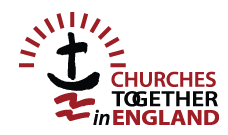The heart of the ecumenical journey
Churches Together in England (CTE) gathers people of different traditions to find new ways of working and worshipping together. Baptist minister Claire Nicholls draws encouragement and challenges after attending its recent forum
 "Forty three denominations gather together to listen."
"Forty three denominations gather together to listen."
I was encouraged right at the beginning of the CTE Forum when the commitment was to listen to many voices and not just one – recognising that listening, speaking and good relationships are at the heart of the ecumenical journey where “unity is achieved whist walking”.
Hearing from new voices, including young adults
The three main voices we heard – Orthodox, Pentecostal and Young Adults – were important voices that had not been a big part of the ecumenical conversation before, and there was an opportunity for all to contribute in small groups and discussion time.
I was encouraged particularly by the voices of the Young Adults for whom denominational identity was important, but who challenged the forum to think outside the box, beyond structures, to building relationships that were genuine and were able to tackle the difficult issues together.
The issue of mental health came up and a number of times we talked about the weight of the burden that young people in particular carry as they try to create identity in a society where identity matters, but is difficult to define.
I talked with a group about the issues that church faces and they were challenged by the idea of being involved in conversations about gender roles and sexuality, and the fact that these were some of the issues that mattered to young people.
There was a lot of concern about ageing congregations, and there were people who were looking for ways in which the trend could be reversed.
I hope, that as a result of the forum, these conversations will continue and the Young Adults contribution will not become a token gesture – that young adults will be invited to help steer the conversations that are happening ecumenically.
The need to talk about the difficult areas of ecumenism
I struggled a bit at times with the forum, because it seemed that the majority of people who were there were only interested in the exciting bits of ecumenism (understandable) but didn’t really want to talk about how difficult it is sometimes – particularly when you are dealing with church structures in a local context.
I felt that there needed to be some space for some honesty about our frustrations beyond our own denominations. However, when I spoke about how difficult my journey had been at times there was an element of surprise and a move to fix me, when all I wanted to do was express myself! It seemed that ecumenism had moved beyond those conversations because they’d been had before, but as someone new to the movement. I found that unhelpful.
Also I believe if we are still finding it frustrating locally, the conversation needs to be revisited and there needs to be space for lament as well as celebration. Honesty builds trust and trust builds good relationships.
Revisiting good and bad stories – and a challenge for Baptists
In his closing address the General Secretary spoke about how “ecumenism is iterative not linear”. I took this to mean that as relationships are being built and trust is growing, that we need to keep revisiting the things that hold us back, that make things difficult and that are historically hard work, so that the stuff that was bypassed can be dealt with or bypassed again if it is not the right time!
I also took it to mean that we need to revisit the good stories – how our history has got us to where we are today – look at how relationships have been built, share stories beyond forum and learn from the passion of those in the ecumenical movement who are able to hold it up as something good and transformational.
A couple of different people talked about how Baptists have something unique to offer to the ecumenical journey – how we act as a bit of a bridge between old and new – churches that are able to work independently and interdependently within a loose structure that enables freedom for movement built on trust.
That’s something I’ve recognised as important on a local level as we’ve worked as an LEP within and beyond Methodist circuit structures. I wonder how, as Baptists, we go about sharing our story to enable us to do that more effectively within the wider ecumenical movement?
The Revd Claire Nicholls is minister of Christ Church, Ramsbottom, a Baptist/Methodist Local Ecumenical Partnership
Baptist Times, 15/10/2015